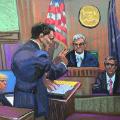In his opening statement on Monday, prosecutor Matthew Colangelo sought to reframe the case against Donald Trump - saying it was about much more than the hush money he allegedly paid to cover up negative information about him.
Instead, Colangelo said, Trump, along with his attorney Michael Cohen and David Pecker, the former chairman of the National Enquirer’s parent company AMI, “formed a conspiracy … to influence the presidential election.”
“The defendant, Donald Trump, orchestrated a criminal scheme to corrupt the 2016 presidential election,” the prosecutor said. “Then he covered up that criminal conspiracy by lying in his New York business records over and over and over again."
“It was election fraud, pure and simple,” Colangelo told the jury.
The scheme was three-pronged, Colangelo said: the trio sought to help Trump kill negative stories about Trump - a process known as “catch-and-kill” - publish favorable stories about Trump and publish negative stories about Trump’s political opponents.
He laid out three different instances where the trio allegedly conspired to prevent harmful information about Trump from becoming public prior to the 2016 election.
The first, prosecutors said, was a $30,000 payment to a former Trump Tower doorman who alleged Trump fathered a child - an allegation that ended up not being true: “It was the first time that David Pecker had ever paid anyone for information about Donald Trump,” Colangelo said.
Pecker, the prosecutor said, was “not acting as a publisher. He was acting as a co-conspirator.” Even after the allegation was determined to be false, Cohen instructed the Enquirer’s parent company not to release the doorman from a non-disclosure agreement until after the presidential election.
The second catch-and-kill deal involved Karen McDougal, who alleged she had an affair with Trump. Trump, Colangelo said, “desperately did not want this information about Karen McDougal to become public because he was concerned about the election.” AMI paid McDougal $150,000 for the rights to her story, the prosecutor said.
"The real reason Pecker directed AMI to make this payment to McDougal was to make sure she didn’t publicize" her account of her affair with Trump before the 2016 election, Colangelo says.
The third alleged instance involved the much-publicized payment to adult film actress Stormy Daniels, who said she also had an affair with Trump. Trump has denied both affairs with McDougal and Daniels.
“Another story about sexual infidelity, especially with a porn star, on the heels of the Access Hollywood tape would have been devastating to his campaign,” Colangelo told the jury. “So at Trump’s direction, Cohen negotiated the deal to buy Daniels’ story," and prevent it from becoming public before the election.







